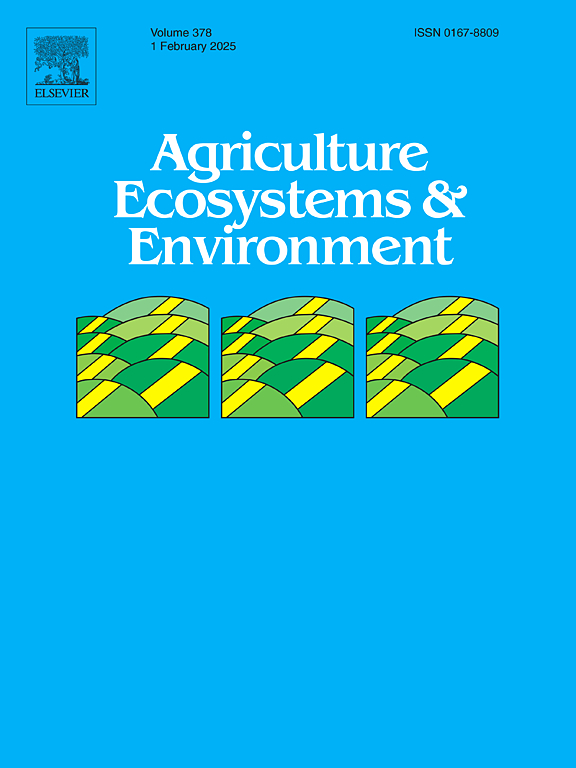Global meta-analysis shows an indispensable role of pollinator diversity in promoting fruit quality
IF 6
1区 农林科学
Q1 AGRICULTURE, MULTIDISCIPLINARY
引用次数: 0
Abstract
Global pollinator decline threatens pollination services, biodiversity, and food security. However, large knowledge gaps remain regarding how pollinator diversity influences agricultural productivity, particularly in relation to multiple fruit quality traits. Here, we conducted a comprehensive global assessment of 79 studies with 451 effect sizes to investigate whether and how pollination services affect various fruit quality traits including organoleptic traits (e.g., size, shape, firmness) and nutritional traits (e.g., carbohydrates, macronutrients, micronutrients). Our analysis confirmed that animal pollination significantly enhances fruit quality by more than 30 %, a finding that is consistently observed across different ecological and agricultural systems, although such effects vary across different quality traits. For instance, organoleptic quality traits are highly dependent on the existence of animal pollination but are insensitive to high-quality pollination. Meanwhile, nutritional quality traits are promoted by increases in both pollinator species richness and visitation rate, although they are less affected by the presence or absence of animal pollination, suggesting a need for high-quality pollination. Interestingly, further analyses revealed that pollinator species richness promotes fruit micronutrients, while visitation rate enhances fruit macronutrients, indicating a complementary role of wild and managed pollinators in boosting fruit quality. Our results highlight the exclusive role of pollinator diversity in sustainable agriculture and therefore reinforce the rationale for wild pollinator conservation in the face of global pollinator decline.
全球荟萃分析表明,传粉媒介多样性在促进果实品质方面发挥着不可或缺的作用
全球传粉媒介的减少威胁着传粉服务、生物多样性和粮食安全。然而,关于传粉媒介多样性如何影响农业生产力,特别是与多种水果品质性状有关的知识差距仍然很大。在此,我们对79项研究的451个效应量进行了全面的全球评估,以探讨授粉服务是否以及如何影响果实的各种品质性状,包括感官性状(如大小、形状、硬度)和营养性状(如碳水化合物、宏量营养素和微量营养素)。我们的分析证实,动物授粉显著提高了果实质量,提高幅度超过30% %,这一发现在不同的生态和农业系统中都得到了一致的观察,尽管这种影响因不同的品质性状而异。例如,感官品质性状高度依赖于动物传粉的存在,但对高质量传粉不敏感。与此同时,营养品质性状受到传粉者物种丰富度和访花率的增加的促进,尽管它们受动物授粉的存在或不存在的影响较小,这表明需要高质量的授粉。有趣的是,进一步的分析表明,传粉媒介物种丰富度促进了果实微量元素的增加,而访粉率提高了果实大量元素的含量,这表明野生传粉媒介和人工传粉媒介在提高果实品质方面具有互补作用。我们的研究结果强调了传粉媒介多样性在可持续农业中的独特作用,因此在面临全球传粉媒介减少的情况下,加强了野生传粉媒介保护的理论依据。
本文章由计算机程序翻译,如有差异,请以英文原文为准。
求助全文
约1分钟内获得全文
求助全文
来源期刊

Agriculture, Ecosystems & Environment
环境科学-环境科学
CiteScore
11.70
自引率
9.10%
发文量
392
审稿时长
26 days
期刊介绍:
Agriculture, Ecosystems and Environment publishes scientific articles dealing with the interface between agroecosystems and the natural environment, specifically how agriculture influences the environment and how changes in that environment impact agroecosystems. Preference is given to papers from experimental and observational research at the field, system or landscape level, from studies that enhance our understanding of processes using data-based biophysical modelling, and papers that bridge scientific disciplines and integrate knowledge. All papers should be placed in an international or wide comparative context.
 求助内容:
求助内容: 应助结果提醒方式:
应助结果提醒方式:


